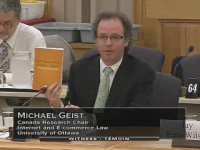Today is copyright day at the Senate, where the Senate Committee on Banking, Trade and Commerce is devoting seven hours to hearing from over 20 witnesses on Bill C-11, the copyright reform bill that passed the House of Commons earlier this week. I was asked to appear and participated in the first session of the day. My opening statement is posted below. The discussion focused primarily on the digital lock rules with a good opportunity to focus on the dangers of the current approach. My recommendation was to use the regulation power found in Bill C-11 to create a digital lock exception linking circumvention to copyright infringement.
Post Tagged with: "c-11"
Day After C-11 Passes, U.S. Chamber Looking For More Canadian Copyright Reform
Hours after Bill C-11 passed third reading in the House of Commons (the bill receives second reading in the Senate today), the U.S. Chamber of Commerce is already calling for more reform. Expressing its support for Canada’s entry into the Trans Pacific Partnership talks, the Chamber argued “issues still remain […]
2nd Tier Status for Canada?: 5 Questions On Canada’s Entry to The Trans Pacific Partnership Talks
U.S. President Barack Obama is expected to announce today that Canada has been offered the chance to participate in the Trans Pacific Partnership negotiations. The offer will be described as big win for the Canadian government, yet reports indicate the conditions for entry may have been very steep. While much […]
Bill C-11 Passes Third Reading, Heads to the Senate for Final Approval
As expected, Bill C-11 passed third reading in the House of Commons last night with a vote of 158-135. It now heads to the Senate, where it received its first reading last night.
The Battle over C-11 Concludes: How Thousands of Canadians Changed The Copyright Debate
There is no sugar-coating the loss on digital locks. While other countries have been willing to stand up to U.S. pressure and adopt a more flexible approach, the government, led by Canadian Heritage Minister James Moore on the issue, was unwilling to compromise despite near-universal criticism of its approach. It appears that once Prime Minister Stephen Harper made the call for a DMCA-style approach in early May 2010, the digital lock issue was lost. The government heard that the bill will hurt IP enforcement, restrict access for the blind, disadvantage Canadian creators, and harm consumer rights. It received tens of thousands of comments from Canadians opposed to the approach and ran a full consultation in which digital locks were the leading concern. The NDP, Liberals, and Green Party proposed balanced amendments to the digital lock rules that were consistent with international requirements and would have maintained protection for companies that use them, but all were rejected. Yet with an eye to the Trans Pacific Partnership as well as pressure from the U.S. government and U.S. backed lobby groups, seemingly no amount of evidence or public pressure would shift its approach. The net result is incredibly disappointing with even Conservative MPs assuring constituents that digital lock enforcement against individuals is unlikely (there are no statutory damages for non-commercial circumvention).
Despite the loss on digital locks, however, the passage of Bill C-11 features some important wins for Canadians who spoke out on copyright.







